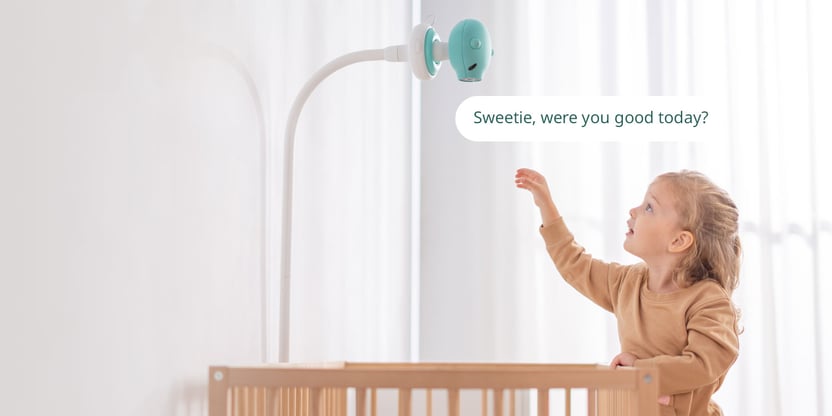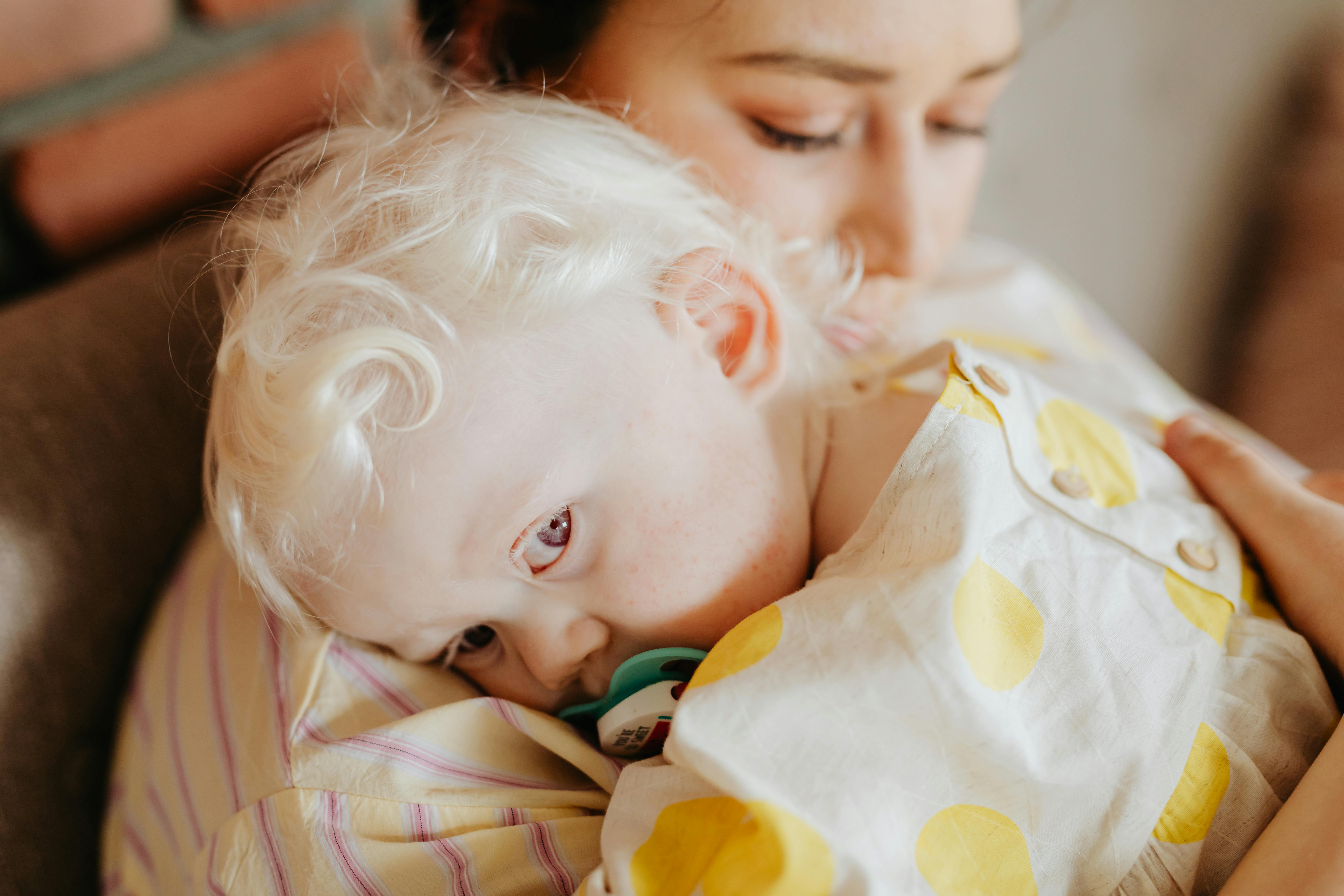Your baby is great with people and always goes to others with ease. They smile at the daycare staff and even let your great aunt who you only see once a year cuddle them. Then, all of a sudden, they stop doing all of that. They cry when you pass them to someone else. They don't want to stay at daycare. They howl when you leave the room. What's going on?
It's normal to be alarmed when your baby has this sudden personality change, but the good news is, it's completely normal. These are all symptoms of separation anxiety — something all children go through — that shows they're developing a deeper awareness of the world around them.
What is Separation Anxiety in Babies?

Separation anxiety is an indication that your baby has started to differentiate between their parents or primary caregivers and the rest of the world. They recognize now that you are special and these others are not the same. For the first few months, all they know is that they find your presence comforting and that being with you is safe — and you smell good! Did you know babies can even recognize their mom's scent before they're born?
But, once they reach a certain age, their awareness develops beyond "Mom/Dad is safe and nice" to "Being away from Mom/Dad is scary", which is a whole new emotion. Suddenly, they worry when you are out of the room, or if they have to go to a different caregiver. This worry presents itself as crying, clinging, and refusing to go to others.
5 Signs of Separation Anxiety
Now that we know what separation anxiety is, you might be wondering what it looks like in real life. Babies don't come with an instruction manual so it can be a bit hard to decipher at first.
Here are a few of the more common signs of separation anxiety on babies
-
- Your baby seems to startle easily and might be waking up at night more often.
- When you leave the room, the baby is quick to start crying.
- Baby keeps a close eye on you when you're not holding or directly next to them.
- He/she may appear "jealous" and get emotional when others have your full attention.
- Anxiety when strangers or not-so-familiar relatives want to hold them, they're quick to cry.
If you're still not sure whether it's separation anxiety or not, there is a quick test for you to try. If your baby is crying when you're away, come back and pick them up. Did they stop crying?
If so, it's more than likely a bout of separation anxiety. However, if they continue to cry it could be something else that's upsetting them such as hunger, a wet diaper, or being scared of an unfamiliar noise.
Causes of Separation Anxiety in Babies
What causes separation anxiety? In simplest terms, your child realizes that they are no longer a part of you. They are a separate person, a "me", with thoughts and feelings of their own. Very small babies have, as far as we know, extremely abstract and intense feelings such as "hungry", "sleepy", "need cuddle", "wet", "cold", etc.; their feelings revolve around their primary care needs.
As they develop, their emotions become more complex, as does their awareness of the world around them and themselves. Once they begin to recognize that they are separate from their parents, the inevitable result is an instinctive fear of being left alone. They suddenly realize that they are completely dependent on you for all their needs and want to keep you as close as they can at all times. That's why you suddenly can't even go for a pee without your baby complaining!
It's important to also keep in mind separation anxiety can be worse when your baby is hungry, tired, teething, or even unwell.
When Does Separation Anxiety Start?
When does separation anxiety start in babies? Because it's a developmental milestone, it can be different for all babies. Some babies will get through their first year without any separation anxiety, then suddenly refuse to go to even beloved family members or friends.
The most common time for separation anxiety in babies is 6-8 months old. At that age, baby's start to explore their world and gain more independence. They are rolling over, crawling, and taking to pull up on objects around the house. With so much excitement in their lives, it's easy for them to get lost in their activity only to suddenly realize Mom and Dad are no longer nearby. This sudden awareness can trigger a strong emotional response.
It's important to note that separation anxiety can — and usually does —continue for years. However, it's rarely a constant and will normally fluctuate depending on events in your child's life and how rapidly they're developing.
For example, expect some anxiety upon starting kindergarten or moving to a new daycare setting. If you change your work routine or get a new job, this could spark separation anxiety again. This doesn't mean you should avoid these things — in fact, it's a good opportunity to let your child know that even when you have to go away, you will always come back and care for them. This builds trust and resilience in your child.
Why Separation Anxiety is a Good Thing
While it may seem distressing to suddenly have a child who cries or whimpers whenever they think you're about to leave, separation anxiety in babies is a good sign. It's clear that your baby is developing a brilliant awareness of themselves, of you, and of how the world works.
It also shows what a great parent you are. You've successfully become the center of your baby's world, and you are everything to them. They love you with every fiber in their being, and that's why it's so tough to be away from you. Thankfully, there are ways to cope with separation anxiety in babies and to minimize any negative impact.
Helping Your Baby Cope with Separation Anxiety

Be Vocal and Confident About Your Absence
Talk to your baby and explain what you are doing.
-
- "I'm just going into the kitchen to get a snack, you're safe in your playpen and I'm coming right back."
- "Mommy is putting you for a nap, I will check on you in five minutes."
- "Your Aunty/Uncle/Grandparent is going to watch you for a little while so I can get some sleep/go to work. I will be back very soon to cuddle and play with you".
Babies might not be able to understand everything you say, but they can certainly read your body language and take cues from what you say. Vocalizing what they can expect with confidence, can help them feel safer and trust that you walking away for a brief moment is indeed okay and nothing to be anxious about.
When you return, tell them you came back, talk to them, cuddle them, and remind them that you always come back when you go. Point out how happy and healthy they are, and they did so well without you.
Create a "Goodbye" Routine and Stick to It
To help your baby feel more in control and less anxious about your departure, give them a ritual that becomes familiar over time. For example, you might have the "goodbye giraffe" that will keep them company while you're away. The giraffe is not a regular lovey that they might play with, but a special treat only to be used when you are away.
Other examples might be singing a goodbye song, a special blankie, or even a photo book with pictures of you and Dad so that they can see your faces even when you're away. Babies are very sensitive to images and the smells of their parents so experiment with which items seem to bring the most comfort to your baby.
Play Pre-recorded Lullabies or Stories by You

Sometimes even the most loving babysitter, coziest blankie, and friendliest "goodbye giraffe" just won't calm your anxious baby. If you're not available to check in, the next best thing is to play a recorded lullaby or storybook reading for your little one.
Pixsee makes moments like this effortless with its crystal clear, playful smart baby monitor that can play curated music hand-selected by you, a selection of white noise, or voice recordings of Mom and Dad.
You can quickly select these options via the app even when you're miles away. Also, with built-in cry detection, you can choose to have a pre-selected soothing song play immediately once your baby gets upset. The Pixsee cry decoder will also help you notice patterns in your baby's cries and help you determine why he or she is upset.
Helping Parents Cope with Separation Anxiety
Separation anxiety is tough on both parents and babies, but it's important to remember that it's a normal developmental phase. Don't blame yourself or feel guilty - it's okay to leave your baby for short periods, whether for work, school, or even just to recharge.
To help both you and your baby manage these moments, consider the following strategies:
-
Maintain a Consistent Routine
Babies thrive on routine, so try to create a predictable schedule for departures and returns, helping your little one feel more secure. -
Use Comfort Items
A favorite blanket or stuffed toy can provide reassurance and help your baby feel more secure in your absence. -
Short, Positive Goodbyes
Keep your goodbyes short and sweet, and reassure your baby that you'll be back. Avoid sneaking away, as it can increase anxiety. -
Stay Calm and Reassuring
Babies can sense their parents' emotions, so staying calm and confident can help them feel more at ease. -
Make the Most of Your Time Together
Spend quality time with your baby when you are home. Play, sing, and talk to them to reinforce your bond and show them how important they are to you. -
Take Care of Yourself
It's important to take time for self-care to recharge and prevent burnout. Whether it's a walk, a quiet cup of coffee, or a few minutes of relaxation, caring for yourself helps you stay emotionally available for your baby.
By creating a secure environment and maintaining a sense of consistency, both you and your baby can navigate separation anxiety with confidence and less stress.
Separation Anxiety in Babies FAQs
1. How long does separation anxiety last?
For most babies, separation anxiety peaks between 9 and 18 months and gradually fades as they grow older and become more accustomed to separations.
2. When should I be concerned about separation anxiety?
If the anxiety significantly impacts your baby's daily activities or persists beyond the typical age range, it might be worth discussing with a pediatrician.
3. Should parents use lovey or comfort object to help with separation anxiety?
Yes, loveys or comfort objects can be a useful tool in managing separation anxiety, providing comfort, and improving a child's emotional well-being. Here are some key points on why and how they can help:
Comfort and Security: Loveys or comfort objects provide a sense of security and reassurance to children. These items can help ease the feelings of anxiety associated with separation from their parents.
Sleep Aid: They can improve sleep by providing comfort during nap times and at night, which can be especially helpful if the child is struggling with sleep issues related to separation anxiety.
Transitional Object: Loveys serve as a transitional object that helps children manage stress and transitions, such as starting daycare or sleeping alone.
Curious about what other features Pixsee, Pixsee Play & Pixsee Friends help you navigate parenthood with ease? Visit our Pixsee Shop and Amazon online store to learn more.







